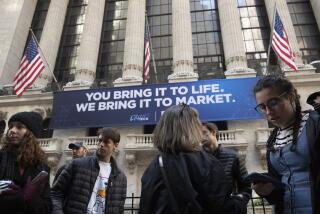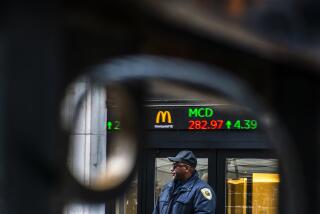Brokerages Make It a Working Weekend : Offices Opened to Clear Up Paper Work, Help Confused Investors
Major brokerage houses across the country flung open their doors and telephones lines Saturday to help confused investors sort out what happened in the stock market last week, but inquiries were surprisingly light.
At a Shearson Lehman Bros. office in Beverly Hills, receptionist Pamela Taylor said things were busy during the week--but not on Saturday. “This week, yes. This morning, no,” she said. “Everybody is sitting at home taking a deep breath.”
Even as investors reviewed what happened to them last week, back room crews on Wall Street and elsewhere worked overtime to process last week’s record volume of stock trades. The job they faced was so overwhelming that New York Stock Exchange traders were called back again today to keep sifting through the huge amount of paper work that remains.
Foot-High Printouts
Sitting behind foot-high stacks of computer printouts, clerks for Merrill Lynch in New York were poring over the week’s transactions, looking for problem trades in which the client’s order did not match the actual executed trade.
“It’s not so much that our computers can’t handle the trades,” said Howard A. Shallcross, a senior vice president. “It’s that we have to resolve the human errors. The tremendous volume on Monday and Tuesday held up the processing of trades and any time you slow that down the operations back up geometrically.”
On Wall Street, parking lots that are normally empty on weekends were full Saturday. Coffee shops that normally are closed were open and streets that normally contained only tourists were alive with traders taking lunch breaks and messengers running trays of buy and sell orders from the brokerage houses to the New York Stock Exchange.
‘Encouraging Sign’
Meanwhile, banks and other financial institutions stepped up their campaigns to induce worried investors to redirect some of their money. “Recently, in very dramatic terms, Wall Street made a strong case for putting your money in Great Western,” says an ad for the federal savings bank. “In today’s financial climate,” here’s an encouraging sign,” says Home Savings of America in new advertisements.
On the floor of the New York Stock Exchange on Saturday, hundreds of traders, specialists and clerks were working to complete orders from as far back as Monday. There was the usual din from the floor, but tempers were less ragged than they had been during this frenzied week of trading.
The exchange decided late Saturday to extend the weekend hours through today. “We did not believe this would be necessary but now we believe it is,” exchange spokesman Richard Torrenzano said.
He said most of the work could have been completed Saturday, but officials decided to send traders home for a rest. He estimated that 700 to 800 of the usual 2,000 floor traders were in on Saturday.
They’re Cleaning Up
Outside the main entrance to the exchange, floor trader George Costa of the brokerage house L. F. Rothschild & Co. took a break. “We are here to clean up the paper work,” he said. “We don’t want problems to get out of hand.”
As usual for a weekend, the exchange was closed to stock trading. But clerks and brokers from Beverly Hills to Miami also were working overtime Saturday.
Ed Tess, operations manager for the Pasadena office of Shearson Lehman Bros., arrived at work at 6 a.m. after working 16-hour days for the entire last week. E. F. Hutton’s operations manager was at the office down the street by 7 a.m.
Major brokerage houses kept unusual Saturday hours for the public in an apparent move to appease concerned customers who had trouble reaching their brokers and executing trades during the week.
Overall, officials said they were rather surprised by the turnout but noted that their customers are not used to doing business on Saturday. Phones could be found ringing intermittently at brokerages but there were few visitors.
Shearson receptionist Taylor said about 10 to 15 people visited her Beverly Hills office. Broker Henri Schkud opened the first of a few accounts that were brought into the office, but by 1 p.m. he was gone and only a handful of the office’s 25 brokers remained at their desks.
Only Third Visit
Dan Castle, dressed in shorts, a T-shirt and hiking boots, was one of the few Southern Californians who could be found visiting a brokerage house on Saturday. He dropped by the Hutton office in Pasadena--only his third visit since he opened his account there three years ago.
Castle, a Lockheed Corp. employee, was concerned because he had not heard back yet on a buy order he placed Tuesday on IBM. “I still don’t know if I bought it or at what price,” he said glumly. “It’s ridiculous I don’t know,” he said, adding that he would just as soon have the money now instead of the stock, “as if the trade never happened.”
By 4 p.m., however, he got a confirmation on the order but said he would probably sell the shares Monday. “After thinking about it, this is not a market for me--but for the institutions. My 100 shares is like dropping a penny and kicking it--like being in a 40-foot wave after it breaks, there’s nothing you can do about it one way or the other.”
Phone Traffic ‘Reasonable’
Elsewhere, the turnout was light. A spokeswoman for Merrill Lynch said three or four clients walked in to each New York area office and phone traffic was “reasonable” but nothing “sensational.”
Michael Ellis in Irvine, regional sales manager for Merrill Lynch, reported after a spot check of Southern California area offices: “There was not a tremendous amount of phone calls nor a tremendous amount of people in off the streets.” But he expects more of a turnout during Merrill Lynch’s special evening hours on Tuesday and Thursday.
There also were complaints Saturday about the difficulty some investors had last week reaching discount brokerage operations, many of which reported being swamped by calls.
Meanwhile, back room traders continue to sort out question trades--those transactions in which there is a dispute between buyer and seller about the quantity of shares traded or their price. Normally, about 2% to 2.5% of all New York Stock Exchange transactions become “question trades,” or QTs, that need to be reviewed.
Under this week’s crushing volume, the rate of QTs rose to 3%-3.5%, Torrenzano said. He also pointed out that the exchange would close early on Monday and Tuesday but no decision has been made whether to curtail trading hours for the rest of the week. “It’s a day-to-day decision,” Torrenzano said.
Reflecting on the tumultuous week just ended, Costa said: “The place was very frightening. I’ve been in this business 27 years and I’ve never seen anything like it. It’s a whole different game now.”
Nancy Yoshihara reported from Los Angeles and John Broder from New York.






